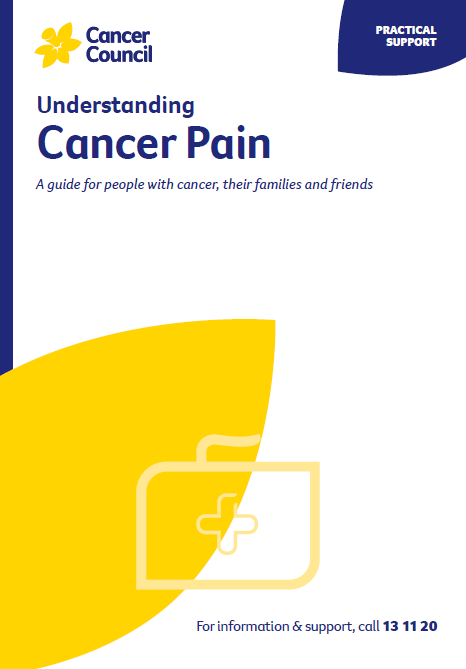- Home
- About Cancer
- Managing side effects
- Pain and cancer
- What is cancer pain?
- Who helps manage my pain?
Who helps manage my pain?
Different health professionals help manage pain. They will often discuss ways to manage pain at a multidisciplinary team (MDT) meeting. If your pain is not well controlled, ask your general practitioner (GP) or palliative care specialist for a referral to a pain medicine specialist who is part of a multidisciplinary pain team.
Health professionals you may see
| general practitioner (GP) | assists with treatment decisions; provides ongoing care in partnership with specialists |
| surgeon | surgically removes tumours from the body |
| radiation oncologist | treats cancer by prescribing and overseeing a course of radiation therapy |
| medical oncologist | treats cancer with drug therapies such as chemotherapy, targeted therapy and immunotherapy (systemic treatment) |
| palliative care specialist | treats pain and other symptoms to maximise wellbeing and improve quality of life |
| pain medicine specialist | treats all types of pain, particularly ongoing pain or pain that is difficult to control |
| pain management team | includes pain specialist and nurses who work together to treat pain, particularly if it is difficult to control |
| nurse practitioner | works in an advanced nursing role; may prescribe some medicines and tests |
| nurse | administers drugs and provides care, information and support |
| pharmacist | dispenses medicines and gives advice about dosage and side effects |
| anaesthetist | provides anaesthetic medicines, monitors you during surgery, and provides pain relief during and after surgery |
| physiotherapist | helps with restoring movement and mobility, and preventing further injury |
| exercise physiologist | prescribes exercise to help people with medical conditions improve their overall health, fitness, strength and energy levels |
| occupational therapist | assists in adapting your living and working environment to help you resume usual activities |
| psychologist | helps identify and manage the thoughts, emotions and behaviours that affect your pain |
| counsellor | helps you understand and manage your emotional response to diagnosis and treatment, usually in the short term |
| social worker | helps with emotional, practical or financial issues |
→ READ MORE: Making treatment decisions
Podcast: Managing Cancer Pain
Listen to more episodes from our podcast for people affected by cancer
More resources
Professor Paul Glare, Chair of Pain Medicine, Northern Clinical School, Faculty of Medicine and Health, The University of Sydney, NSW (clinical update); Dr Tim Hucker, Pain Specialist, Northern Beaches Hospital, Director, Northern Beaches Pain Management, NSW (clinical update); Dr Keiron Bradley, Palliative Care Consultant, Bethesda Health Care, WA; A/Prof Anne Burke, Co-Director Psychology, Central Adelaide Local Health Network, President, Australian Pain Society, Statewide Chronic Pain Clinical Network, SA, School of Psychology, The University of Adelaide, SA; Tumelo Dube, Accredited Pain Physiotherapist, Michael J Cousins Pain Management and Research Centre, Royal North Shore Hospital, NSW; Prof Paul Glare (see above); Andrew Greig, Consumer; Annette Lindley, Consumer; Prof Melanie Lovell, Palliative Care Specialist HammondCare, Sydney Medical School and The University of Technology Sydney, NSW; Caitriona Nienaber, 13 11 20 Consultant, Cancer Council WA; Melanie Proper, Pain Management Specialist Nurse Practitioner, Royal Brisbane and Women’s Hospital, QLD; Dr Alison White, Palliative Medicine Specialist and Director of Hospice and Palliative Care Services, St John of God Health Care, WA.
View the Cancer Council NSW editorial policy.
View all publications or call 13 11 20 for free printed copies.

